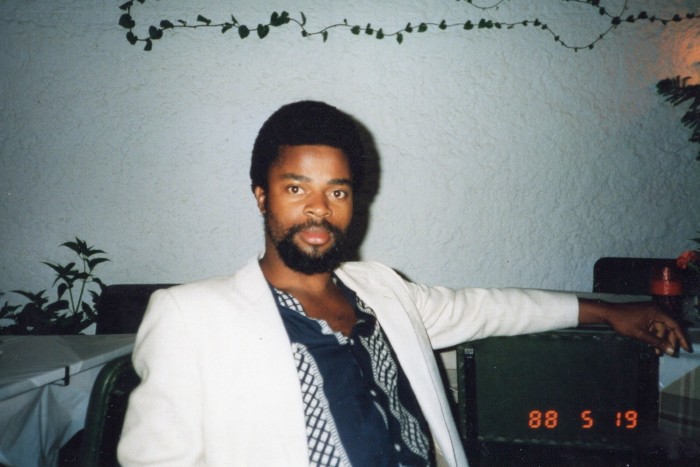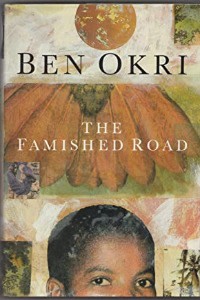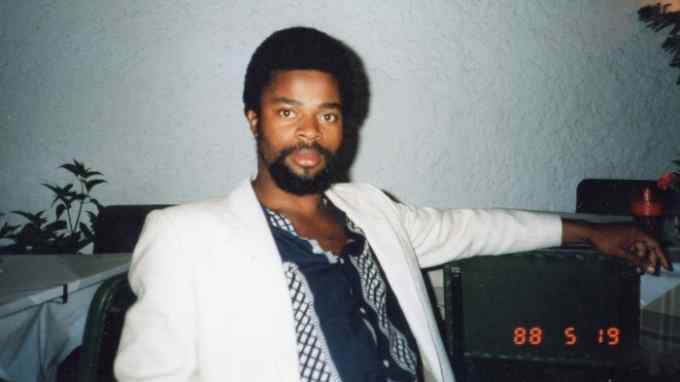‘The Famished Road’ and my quest for the imaginative richness of Africa

Roula Khalaf, Editor of the FT, selects her favourite stories in this weekly newsletter.
While living through my own childhood — listening to stories the elders told, having herbalists treat my glaucoma — I was aware that it would make a magnificent book. I began reading early and always had a sense of life as something that would be read. This does not mean that The Famished Road, my third novel, which won the Booker Prize in 1991, was autobiographical; only that the strange realities of life seemed already to belong to the magical world of reading.
The novel was begun before I realised it. At the University of Essex, in 1981, I wrote a long short story set in London. It later grew into a novel. A good friend said there was something unusual about the early passages set in Africa. This comment set me on the path to The Famished Road, a novel about a spirit child in Lagos around the time of independence.
In the years before working on the novel, I had been dissatisfied with the way I was writing. I was applying the realistic narrative tradition to Africa — but the techniques used to describe western life were inadequate for depicting the multidimensional world of my childhood. This led to a crisis. I needed to find a new way to convey the imaginative richness of Africa. The existing techniques simply would not do anymore.
My father’s belief in the enduring presence of the ancestors, things I saw that could not be rationally explained, the reality of ogbanjes or abikus, the enigmatic way my mother told stories, the flamboyant way people narrated their experiences, all made it clear to me that I had to reconfigure my language and my storytelling. I had to invent a tone that could accommodate the ordinary and the mythical, the poetic and the uncanny.
In Africa, for over a century, we have described our reality through the language and perception of others. But to observe our reality through our own eyes requires a purification of mind and a reinvention of language.
The solution was to find a way of telling stories that was truer to our realities. It meant going back to the beginning of language itself, the way a child learns to speak and write, then putting it all back together again in a fresh way. The realistic technique is sequential, but the realities of which I speak are often spiral, sometimes tangential, possibly simultaneous. By the time I started to write The Famished Road, in the spring of 1986, I was ready.
I was living then in Lorraine Road in north London, in a maisonette belonging to a BBC executive who had split up with his wife. I had a big sunlit room in which to write and a large desk. It was my first real accommodation after my brief homeless period in London, in the early 1980s.
Then, that year, I had to go to Nigeria to write about forthcoming elections for a newspaper. I was there for a few weeks, during which time I published essays critical of the political situation, before suddenly being advised to leave immediately as my name was on a wanted list.
I returned to the Lorraine Road flat with new inspiration. That was when The Famished Road really came into existence. I kept the new tone I had discovered, writing with a mixture of innocence and knowledge, the knowledge of one who has transcended death. I wrote to alter the way we saw reality, to transfigure fate with a burst of freedom.

The novel is about Africa and childhood and imagination and suffering and what we must become to change our destiny and the traps of history and the unsuspected powers that can transform our lives and a hundred other things. There was even an environmental theme, the devastation of forests. All this was complicated by telling a real story and walking a tonal tightrope every day. Most of the first draft of The Famished Road was written in Lorraine Road. It is one of the places I’ve been happiest writing.
Then I moved to Axminster Road, near Finsbury Park. My finances were running low, so I broke off from the novel to finish a book of short stories, Stars of the New Curfew, for which I got a helpful advance. But my landlady was difficult and I had to move out. I went on to rent a flat from Margaret Busby, the celebrated publisher, whom I had known for years. It was in her flat, in Notting Hill Gate, that I started rewriting The Famished Road.
I wrote in a small room with a little bed on which I spread manuscripts and notes and items of research. I listened to jazz and African and classical music. I read everything: the literatures of Africa, Europe and the Americas, French semioticians, obscure texts, art books, literary criticism, books on mythology and history, volumes of poetry. I soaked myself in movies. Each day gifted me with new and amazing literary possibilities. The novel was written on a magic tide of freedom.
There were times, writing at night, when the story I was telling would spook me. Those where nights when I feared for my sanity. I couldn’t shake the feeling that when people read the novel, they’d think something was wrong with me. It must have taken a species of madness to write The Famished Road. It certainly took a stronger psyche than I realised I had to work on that taboo-breaking material, and to withstand the horrors involved. Writing about the spirit world at night, for a long period, is dangerous if you come from a land that believes in them. Spirit children, born several times to the same mother, have a special mythology about them, part dread, part magic.
No one knows what I went through writing that book. You would have to have grown up in Nigeria when I did, with all those beliefs, fears and terrors, to understand what it took to push through that spirit material. While I wrote, I saw them — the spirits. They crashed through the doors of my sleep. I just kept on writing.
I was at Margaret’s flat for about a year. When she needed it back, I moved to a basement flat in Little Venice. That was where The Famished Road was finally completed. It was while I lived there that the novel was accepted and published by Jonathan Cape.
And it was there, one afternoon, that I saw a van going past my window. It had “Booker” written on the side of it. An hour later, I had a call telling me that The Famished Road had been shortlisted for the Booker Prize. I remember that my mood was particularly fine at that time. I felt some magic condition of life, as if I had reached a sort of beatitude.
That fine mood might have had something to do with being 31 and having taken control of my life, after an epic struggle, through the power of writing alone. I had pushed the rock of Sisyphus to the top of the hill and gone back down to do it again.
Ben Okri’s latest novel is ‘The Last Gift of the Master Artists’ (Apollo). ‘The Famished Road’ is now an Everyman Classic
Join our online book group on Facebook at FT Books Café

Comments